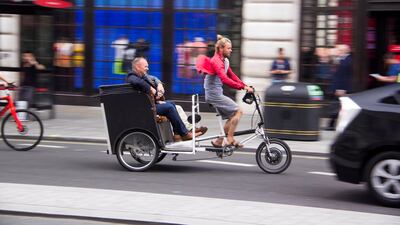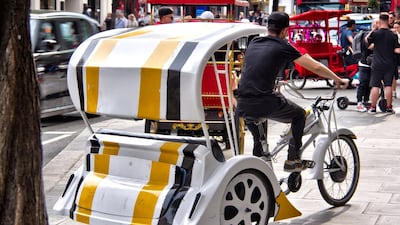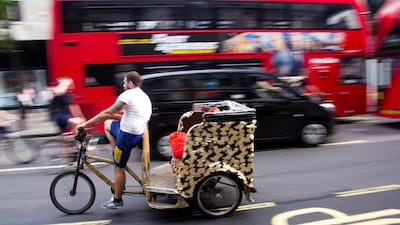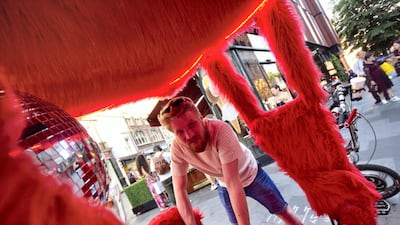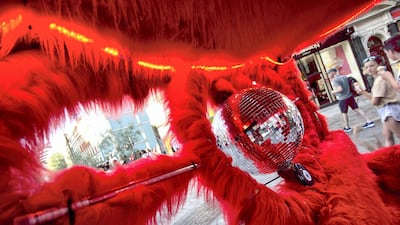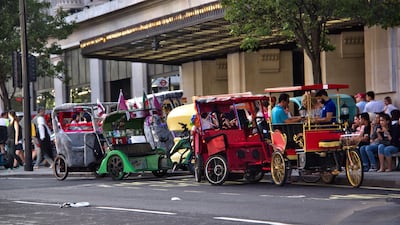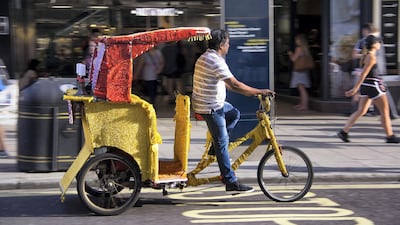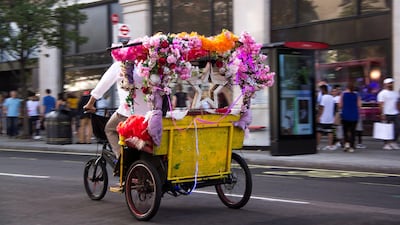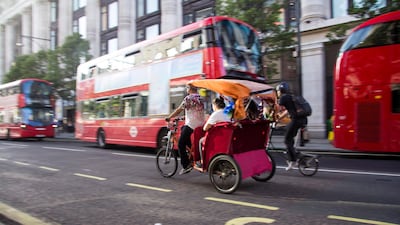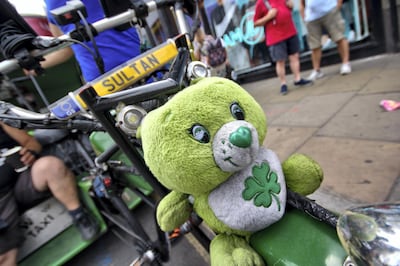There's a row of colourful cycle rickshaws parked helter-skelter on the pavement. Some are festooned with fur, a few gaudily glittering with tacked-on tinsel and tassels, while others are jarringly bare or make do with a simple splash of colour in a vain attempt to stand out among a visual assault of inharmonious shapes and hues. One of them almost manages it, thanks to a classical four-seater carriage in either an Asian or Ottoman style – they're frankly interchangeable in this scenario.
But where is this veritable feast of Instagrammable street exotica? The centre of Delhi? Or the backstreets of Bangkok? Nope. We're in the West End of London. On Oxford Street, actually, right in front of Selfridges department store.
Cycle rickshaws, also known as bike taxis or pedicabs, have been operating in central London for more than 15 years. In the last few years or so, they have evolved from being basic tricycles with extra seating to rolling works of questionable art akin to Filipino jeepneys (but not quite that impressive), complete with glowing or flickering lights and music systems that will put your Maybach to shame when it comes to vehicle wattage.

It turns out that a large proportion of paying passengers are Arab visitors to the British capital. That is why you see many of the pedicabs flying flags from the region, decorated with Arabic inscriptions and blaring Middle Eastern music. All of this seems incongruous in a city some would have you believe is under siege by the demons of terrorism and race hate.
There are estimated to be up to 1,400 bike taxis in the city, according to Transport for London, but contrary to what many tourists believe, they are not licensed or regulated – which means they can be dangerous (police data shows 67 personal injury collisions, six resulting in serious injury, over the past 13 years).
They are legal, however, thanks to a quirk in the law, and operate as "Stage Carriers" as per the Metropolitan Public Carriage Act of 1869. And while the mayor's office does concede that "many tourists do opt to use them as they are a great way to see Central London", Mayor Sadiq Khan has asked the government to regulate pedicabs.
For now, anyone can buy and run one. They can cost anywhere between £500 (Dh2,246) for used examples to £8,000 for new, electrically assisted versions. Driver Sultan Selim, 38, is on his sixth bike taxi, which he bought about five months ago. Customising it and adding an electric drive motor and a stereo system saw his investment rise to about £7,000. He earns as much as £1,000 a week during the summer season – although that can drop to as low as £200 or even less during the cold winter. The Turkish former electrical engineer has been doing this for nearly nine years. He's a big guy with a big personality and is usually found near Bond Street station. He says he loves this job because "I'm the boss of myself."

Selim is the sort of rickshaw driver you want, as he loves to entertain his passengers. "I ask them what kind of music they like," he says. "Do they want a love song or dance music? If dance, then I will dance all the way, and they do, too. They are happy, I'm happy and I love it!"
Melihcan Vuraler, 26, also from Turkey, is more pragmatic. "What do I like about this job? The money." Unsurprisingly, he's a bit of an entrepreneur and owns three pedicabs, two of which he rents out. His own is lined with thick red fur and has a disco ball in the back. "That's the only thing that was there before," he says. "I customised all the rest of it and even widened the seat by 30cm." His bright red rickshaw is very popular and unlike his compatriot, Vuraler earns well even in winter. "It's the best time for me because of the Christmas lights and Winter Wonderland in Hyde Park."
But how much does – or should – a ride cost? A TFL spokesman says there have "been reports of passengers, often tourists, being charged exorbitantly high fares. A number of these incidents have made media headlines and videos have been posted online." Steve McNamara, general secretary of the Licensed Taxi Drivers' Association, is harsher with his words: "These rip-off rickshaws do London a disservice, fleecing tourists and causing traffic chaos."
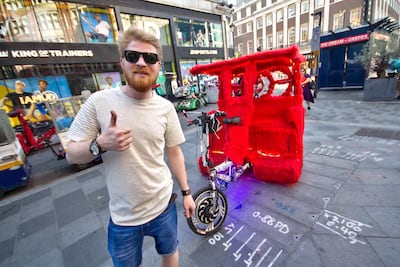
Vuraler charges a minimum of £10 per ride if it's a short distance – otherwise it's £3 a minute. Selim confirms the same rate, although he offers discounts to regular passengers. Typical charges, according to him, would be Bond Street to Piccadilly for £40, or £60 to Knightsbridge. Everyone agrees it is better for passengers to decide on a rate before getting a ride.
Prices may seem steep, but these guys work hard for their money. In fact, they're on the clock between 10 and 12 hours a day, although they're not pedalling that whole time. The pedicabs have electric motors in them – the pedals drive an alternator, which in turn charges the batteries that power the rear wheels.
Vuraler and Selim also welcome potential licensing requirements. “It will be good for us,” says Vuraler. “In France, they banned some riders because they were dangerous and involved in crime – those guys came and started up here.”
Selim, a former nightclub bouncer, says he's wanted to apply for a licence from Westminster for a while now. "In this job we are vulnerable to attack by thieves," he says. "Anybody can show you a knife and steal your earnings. I have been attacked!"
While Selim and Vuraler are clearly legitimate businessmen, many other pedicab operators did not want to speak to us or have their photo taken. "The unregulated nature of the pedicab industry means that there is no requirement for the riders to undergo enhanced Disclosure and Barring Service, character or right-to-work checks," a TFL spokesman says. "We don't know who the riders are and whether they are fit and proper to be carrying passengers."
Speaking to a rider from Bangladesh, it starts to become apparent why some want to keep a low profile – he's involved in a legal tussle for his right to remain in the UK. But that isn't the only reason he doesn't want to be featured in this story: as a former economics teacher, he says he has been derided by his family back home for doing what they consider a "slave" job.
By contrast, another South Asian rickshaw wala is positively ecstatic to show me his exuberantly decorated and delightfully tacky pedicab. It's clearly inspired by Indian weddings, complete with shimmering gold upholstery, a bridal red canopy and electric lamps on the back. However he, too, asked to remain anonymous for this piece.
Conceding that regulation can’t come soon enough, I nonetheless seek out Selim to restore my faith in the lure of dazzling bike taxis. “In this job if you be smiling to everyone, everyone smile to you,” he says with a grin. “If you say ‘hello, how are you?’ wherever they are from, whoever they are, they say ‘hello’ back to you. If you do positive, you take positive.”
And that’s the best thing about the culture-clash pedicabs of London – they cause you to smile and make you happy. And that’s got to be good for tourism, right?

